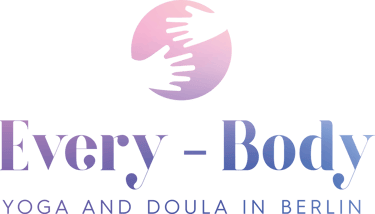Postnatal Yoga Präventionskurs in Berlin in English
YOGAPOSTNATALPOSTNATAL YOGAPOSTPARTUMMOTHERBERLINPRAVENTIONSKURS
Kiezoase, Barbarossastr. 65, 10781 Berlin (Schöneberg)
8 weeks € 129/reimbursed by health insurance
in English, with an additional weekly video of the recorded yoga practice
Check my calendar for more info and registration
Taking care of our postpartum bodies in a group of supportive mothers, guided by a postpartum doula. This class uses asana (positions), movements and pranayama (breathing) to heal and support body, mind and heart, with the safety and awareness of the Pranayoga Method®. You are welcome to bring your baby or to come by yourself. From about 6 weeks after a vaginal birth, or 8 weeks after a cesarean birth, as long as your body feels ready for it and your doctor has encouraged you to resume your practice.
FAQs
Q: When is a good time to join the postnatal yoga course?
A: You can join starting from 40 days after a vaginal birth or 60 days after a belly birth. It is good practice to discuss this with your midwife or gynecologist, and ask them if they encourage you to resume physical activity. The time that participants usually find very good is after Rückbildung, but while their baby is not yet very mobile.
Q: How often do you offer these courses?
A: We typically start one cycle in January, one in April, one in September and one in November. Outside of the courses, I also offer private sessions and recorded videos of previous courses. Get in touch to know more.
Q: What is the focus of the postnatal practice?
A: It is a practice targeted to “the core”: pelvic floor (I am specifically trained in Pelvic Floor Yoga), abdomen (including support for abdominal separation, or diastasis recti), back and diaphragm. We use the breath as a tool of self-care and guide in movements. We also practice positions and movements that support the body of a new mother, who feeds and carries a growing baby.
Q: Can I join with my baby?
A: Yes, if you want. Some mothers find they can practice with their babies until they are not very mobile. Some others set their yoga practice as a “me” time, when somebody else is going to take care of the baby. In any case, we usually record the online practice, so that you can watch it again if it was not easy during the class. And of course we can catch up if you have any questions.
Q: What happens if I miss a class?
A: We usually record the online practice, so that you can watch it again if you could not make it to class. And of course we can catch up if you have any questions.
Q: Is the postnatal yoga course a Rückbildung?
A: No, it is not specifically Rückbildung, it is a Präventionskurs. The difference is: a Rückbildungkurs is usually taught by a midwife, it is covered by your health insurance within 9 months of giving birth. This postnatal yoga Präventionskurs is taught by a hatha yoga teacher, who is also a doula, and it is reimbursed independently from birth, officially as prevention against stress.
Q: Can I do postnatal yoga instead of Rückbildung?
A: Rückbildung is not required for participating in the postnatal yoga course, but… why not doing it? 🙂 You can claim reimbursement for both independently from one another. So if you have the time and enjoy this, you are encouraged to do both.
Intention
My intention is to offer deep work that does not feel like hard work.
Both the prenatal and the postnatal yoga I offer in Berlin are Präventionskurse: reimbursed by health insurance, their aim is to help preventing chronic stress. Why is this important?
Particularly for the prenatal and postnatal groups, a practice that reduces stress and inflammation is a practice that reduces the perception of pain and increases the body’s healing powers.
A yoga practice centred around the breath not only has physical effects, but opens access to a deeper calm, sometimes almost hypnotic state.
The practice I propose both for prenatal and postnatal yoga suggests that letting go of doing and controlling may be one of the best things you can do for birth and postpartum.
In these classes we are not asked to be competitive, making something happen all the time, proving our strength and determination, or constantly rationalising our experience.
Accepting our feminine side is the deepest message I want to send. Being receptive, allowing, receiving, trusting, healing, nurturing are all states grounded in sensitivity and connection with the world around us.



